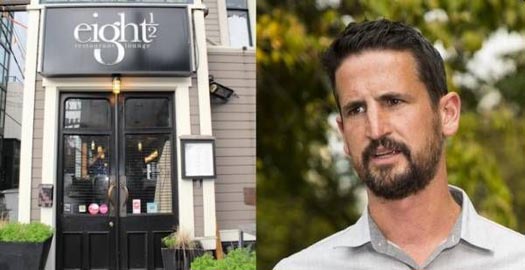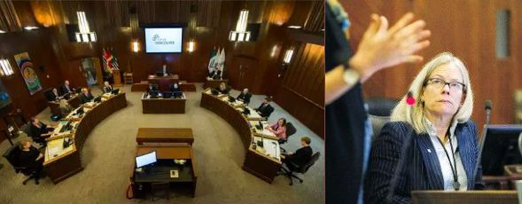
On Sunday morning, September 20th, at 10:30 a.m., Charlie Smith, the longtime editor of The Georgia Straight, and avid and well-practiced journalist covering municipal politics in Vancouver, broke the story that UBC professor and esteemed municipal affairs jurist Raymond Young, following an exhaustive three-month investigation authorized by the office of the Mayor of Vancouver, “declared that [Green Party Vancouver City] Coun. Michael Wiebe is disqualified from holding local office until the next election, due to a conflict of interest.” Says Young in his report …
“Despite apparently being knowledgeable about conflicts of interest, on May 13th, Councillor Wiebe put forward the amendment [for] ‘staff to work directly with business operators to identify immediate patio seating options.’ Councillor Wiebe had to know that he was a business operator,” Young wrote. “His proposed and passed amendment enabled Councillor Wiebe to wear two hats when dealing with city staff: that of the Council member and that of the business owner.
“This was a clear conflict of interest situation that he deliberately set in motion. This conflict of interest cannot be viewed as an inadvertent action.”
Raymond Young recommended in his 14-page report — submitted to Mayor Kennedy’s Stewart’s office on September 12th — that “it would be ‘appropriate’ for Wiebe to resign his seat on council,” arising from a conflict that involved his ownership of Eight ½ Restaurant Lounge, and substantive financial interest in the Portside Pub, both of which businesses directly benefited from Wiebe wearing ” two hats when dealing with city staff: that of council member and that of business owner,” Young wrote in his findings.

At this point, let’s backtrack a little, to more fully contextualize the timeline of events that led up to Raymond Young’s determination that Councillor Michael Wiebe must resign his seat on Council, and disqualify him from holding office on city council, the park board, other local government, or as a trustee under the Islands Trust Act until the next general election.
On June 5th, 2020 at 9:48 a.m., The Straight’s Charlie Smith published an article calling into question the propriety of Wiebe’s involvement in “participating in the discussion of a matter, vote on a question in respect of a matter because of a direct or indirect pecuniary interest.”
On his financial disclosure statement and on his Linkedin profile, Wiebe lists himself as the owner/operator of Eight 1/2 Restaurant Lounge (151 East 8th Avenue). It won approval for its application for a free temporary patio permit from June 1 to October 31. These permits allow business owners to use on-street parking space or sidewalks in front or beside their establishments.
According to the May 13 city council minutes, Wiebe did not absent himself from discussions or voting on a motion to “approve in principle the prioritization of additional staff and budget resources to support the allocation of flexible, innovated, and expedited patio space”. In addition, that motion directed staff “to seek out cost recovery opportunities where possible and where reallocation of public space may be for private use”.
On May 27, Wiebe seconded a motion by NPA councillor Sarah Kirby-Yung calling on council to temporarily waive all permit and application fees associated with the temporary expansion of patio spaces.
Under section 145.2 of the Vancouver Charter, a council member must issue a declaration if they consider that they are “not entitled to participate in the discussion of a matter, or to vote on a question in respect of a matter” because of a direct or indirect pecuniary interest. If a councillor has a direct or indirect pecuniary interest, the council member must not remain or attend at any part of a meeting in which this matter is under consideration. In addition, a councillor cannot participate in a discussion, vote on the matter, or influence the voting on the matter.
“A person who contravenes this section is disqualified from holding office as described in section 145.911 [disqualification for contravening conflict rules] unless the contravention was done inadvertently or because of an error in judgment made in good faith,” the Vancouver Charter states.
On June 4th, 2020, Vancouver City Hall had issued a permit to Eight ½ Restaurant Lounge, one of 14 restaurants to receive approval for a patio. Wiebe submitted his application on June 1st. According to various reports, in the weeks leading up to June 1st, Wiebe worked with city staff to prepare the drawings and provide all of the necessary documentation required for a successful patio application — giving him a lead time for his application that would have been unavailable to other applicants … which is to say, those not sitting on Council, and those citizens who did not have as ready access to city staff as would be the case with a sitting City Councillor.
On June 6th 2020, non-practicing lawyer Michael Redmond, based on The Straight story above, lodged a Code of Conduct complaint with the City of Vancouver, triggering Raymond Young’s city-authorized investigation.
Upon receipt of the Code of Conduct complaint, Councillor Wiebe attended at City Manager Sadhu Johnston’s office to be advised of the complaint, and to sign off on the appointment of the individual who would conduct the investigation. Mr. Wiebe readily agreed to Mr. Young taking on the role of investigator, committing to his full co-operation with the investigation.
In fact, that June 6th meeting in the City Manager’s office was the last time Mr. Wiebe appears to have given any thought at all to the investigation, for in point of fact, he did not either meet with Mr. Young, nor provide answers to any of the questions submitted by Mr. Young to Mr. Wiebe, nor did he provide any aid whatsoever to Mr. Young in the conduct of the Code of Conduct complaint that had been lodged against him. Mr. Wiebe, it would appear, only gave thought to the matter when Charlie Smith published his Sunday morning, September 20th article in The Georgia Straight.There has been speculation in the community as to whether someone in the Mayor’s office was the source who provided Raymond Young’s report to The Straight. In fact, VanRamblings is advised that it was the complainant, Mr. Redmond, who provided Mr. Smith with a copy of the Young report, which he had received from Mr. Young on September 12th, the same date the report was submitted to the Mayor’s office. We understand that a second municipal affairs reporter — who we expect was CBC municipal affairs reporter, Justin McElroy — was also provided with a copy of the report.
In the curious and curiouser department, when Councillor Sarah Kirby-Yung lodged a formal Code of Conduct complaint against her fellow Councillor, Jean Swanson, City Manager Johnston sent out notification of the complaint to Council and senior city staff. The Code of Conduct complaint against Ms. Swanson was amicably resolved when Councillor Swanson provided an apology to Councillor Sarah Kirby-Yung.

Vancouver City Council. Councillor Colleen Hardwick looks askance at a Council colleague
In the past two years, Councillor Colleen Hardwick has had two Code of Conduct complaints filed against her, the nature of both investigations requiring Ms. Hardwick to engage the services of a municipal affair lawyer, Bob Kasting, requiring of her the expenditure of monies in legal fees to respond to each complaint.
Relating to both Code of Conduct complaints, the City Manager posted e-mails to Council and senior staff informing them of the filed complaints.
Relating to the first complaint filed against Councillor Hardwick, The Breaker News’ Bob Mackin published an article on July 11, 2019, writing the following …
Lawyer Henry Wood dismissed pro-density activist Peter Waldkirch’s Jan. 16 complaint against Colleen Hardwick, finding no evidence that the 2018-elected councillor used her PlaceSpeak.com civic engagement company improperly.
Waldkirch’s complaint to city manager Sadhu Johnston took issue with a page on the PlaceSpeak website showing Hardwick and an image of city hall with the headline “You don’t need to wait for an election to have your voice heard — I’m listening.” Waldkirch, a research lawyer, alleged that Hardwick was confusing citizens and using public office to benefit her private company.
“I do not believe it is appropriate for her to use it for city business and there is at least the appearance of this,” Waldkirch wrote in the email to Johnston, obtained via freedom of information.
Waldkirch went further on Twitter, just over 30 minutes after his initial complaint to Johnston. He publicly accused Hardwick of “attempted privatization” of public engagement and called PlaceSpeak a “black box.”
In his report, Wood wrote, “We are dealing with a soft launch of a consultation site on which the only question posed was ‘Do you think that you are being heard by the City of Vancouver?’ There is no obvious potential conflict arising from the substance of that issue.”
Further to the above, Councillor Hardwick had offered the services of PlaceSpeak to all members of Council, at no charge, furthering lessening any appearance of impropriety or conflict.
Note might be made at this point that, as is the case with the Code of Conduct complaint filed against Councillor Wiebe, investigators hired to investigate Councillor Hardwick received in excess of $20,000, on each occasion, for their investigative work, and the writing of a report.
Yes, that’s right, in excess of $60,000 has been paid to date to investigators conducting inquiries, and the writing of reports, related to Code of Conduct complaints lodged against two Vancouver City Councillors. One Councillor was exonerated … twice. One was not.

Note should also be made that although the City Manager’s office posted e-mails to Council and senior staff relating to the Code of Conduct complaints filed against Councillors Swanson and Hardwick, at no time did the City Manager post correspondence to Council and senior staff respecting the Code of Conduct complaint filed against Councillor Wiebe.
One is left to wonder, why would that be the case?
Note should further be made that Councillor Hardwick took the matter of the Code of Conduct complaints seriously, and determined early on that she would require the services of her own legal counsel in order that she might properly respond to each Code of Conduct complaint.
Councillor Michael Wiebe, on the other hand, appears not to have taken the Code of Conduct matter at all seriously, and unlike his more mature distaff Council colleague did neither engage the services of legal counsel to traverse the rocky shoals of legal engagement, nor in any way, shape or form co-operate with the investigation, not meeting with investigator Young, nor answering any of the questions provided to him by Mr. Young.
Why is it that Vancouver City Councillor Michael Wiebe chose to — it seems abundantly clear to this writer — not take the filing of a Code of Conduct complaint against him at all seriously, why did he consciously choose not to engage the services of his own legal counsel and, finally, why did Councillor Wiebe not co-operate with Raymond Young in the conduct of the investigation of the serious Code of Conduct complaint filed against him?